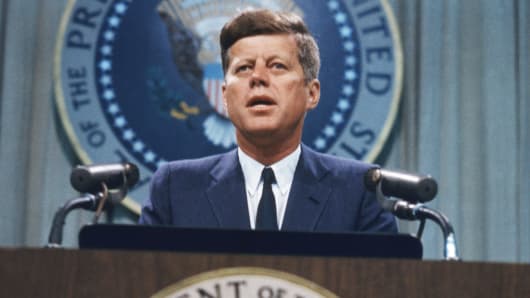In their new book "JFK and the Reagan Revolution," CNBC senior contributor and former Reagan administration economist Larry Kudlow and historian Brian Domitrovic make a bold statement: Former President John F. Kennedy was a big believer in supply-side economics. That's a concept that is more often associated with former president Ronald Reagan and Republicans than Democrats.
Why a book on JFK and Reagan now?
Kudlow believes that Hillary Clinton and the rest of today's leading Democrats have forgotten JFK's true economic gift to his party and the rest of the country — supply-side economics. But, he also says Donald Trump is a true supply sider and would implement growth-inducing tax cuts if elected.
I sat down with Larry Kudlow at CNBC headquarters this week to discuss the book and the still mostly unknown story of how President Ronald Reagan admired JFK's economic policies and was determined to emulate them.
Your book tells the untold story of how the intellectual link between JFK and Ronald Reagan came about. What was Reagan's path to favoring lower taxes across the board to boost economic growth?
Kudlow: Both Reagan and Kennedy were not supply-siders to begin with. Reagan was even raising some taxes when he was governor of California. But in the late 1970s, supply-side economists Art Laffer, Robert Mundell, Alan Reynolds, and Bruce Bartlett all met with Wall Street Journal editorial page editor Robert Bartlett to discuss how to spur American economic growth. They eventually converted Bartlett to their way of thinking, which was also about a strong dollar in addition to tax cuts. Soon after they also converted former NFL star and then-Congressman Jack Kemp. Bruce Bartlett was on Kemp's staff and one day it was Kemp himself who said, "Why don't we just duplicate the Kennedy tax cuts?" Many of those same people started selling that philosophy to Reagan around that time, but again it was Kemp who really convinced him. By 1977 or 1978, Reagan was a dyed-in-the-wool supply-side tax cutter.
What was Kennedy's path to lower taxes?
Kudlow: Kennedy's path was different. He was fine with continuing the Democrats' higher tax policies coming into office, but he soon became disenchanted with the economy and desperately wanted to do something to spur 5-percent growth or something close to that. That's where a really unsung hero in this story comes in. Because Kennedy had won the 1960 election by a cat's whisker, he appointed a few Republicans to his cabinet in the spirit of bi-partisanship. One of those Republicans was Treasury Secretary Douglas Dillon who worked for more than a year to convince Kennedy that the only way to 5-percent growth was cutting tax rates for businesses and individuals. Dillon wasn't just smart, but as a Groton and Harvard graduate, Kennedy saw him as his social equal. That helped win the day. By early 1962, JFK was convinced and he even previewed his upcoming tax policy bill during a speech at the Yale graduation ceremonies that spring. Dillon then kept up the hard work along with Assistant Secretary of the Treasury Stanley Surrey, who happened to be a Democrat but a Democrat who hated the tax code. Dillon and Surrey implemented a policy JFK could sell to Congress and Kennedy did get it passed in the House before his death in 1963.
President Lyndon Johnson took the ball after that and got the bill passed in the Senate and enacted into law. Consequently, economic growth soared during the first few years of the Johnson administration. But later in his presidency, LBJ reversed the policy and raised taxes. President Nixon also raised taxes and two recessions were the result. At that point it looked like JFK's excellent economic legacy would be lost."




